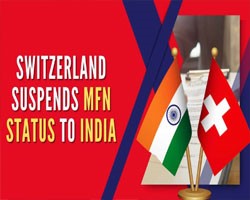SSC Current Affairs
TABLE OF CONTENTS |
| Economy |
|---|
|
|
|
Why in the news?
Switzerland's decision to suspend the most favoured nation (MFN) treatment for India under their double-taxation avoidance agreement (DTAA) from January 1 is unlikely to have any immediate impact on trade. What is the Most Favoured Nation (MFN)? Meaning: An MFN clause mandates a country that provides a trade concession to one trading partner to extend the same treatment to all trading partners. It is a founding principle of the World Trade Organisation (WTO). For example, if a WTO member country reduces a tariff on a product for one trading partner, it must also extend that same tariff reduction to all other WTO members. Purpose: MFN aims to replace power-based policies with a rules-based framework, where trading rights are not dependent on a country's economic or political clout. Pros and Cons of MFN: Exemptions: The WTO provides the following exemptions from MFN provisions - When members strike bilateral trade agreements or when members offer developing countries special access to their markets. Trade blocs like the European Union (EU), are allowed to discriminate against imports from outside the bloc. Trade barriers in response to unfair competition, etc. WTO members can impose any trade measures they want on countries that are not members of the WTO (Iran, North Korea, Syria, Belarus, etc). Removal of MFN status: There is no formal procedure for suspending MFN treatment and it is unclear whether members must notify the WTO if they do so. For example, India revoked Pakistan's MFN status following the Pulwama attack in 2019. Pakistan has never granted India MFN status. India-Switzerland Double Taxation Avoidance Agreement: The India-Switzerland Double Taxation Avoidance Agreement, signed on November 2, 1994,was later revised in 2000 and 2010. The agreement sought to reduce the dangers of double taxation to promote easier cross-border investment and trade. One of the treaty's most important provisions, the MFN clause, guarantees that nations treat investors from partner nations equally to those from any other third country. For example, under the MFN provision, it was anticipated that Indian companies would receive additional benefits or lower tax rates if Switzerland provided them to another nation. Reason for suspension of the MFN clause: The Swiss government cited a lack of reciprocity as the basis for suspending the MFN clause. Swiss authorities stated that they could not apply reduced tax rates unilaterally without mutual agreement from India. The Nestle case: Switzerland cited a 2023 ruling by Indian Supreme Court in a case relating to Vevey-headquartered Nestle for its decision to withdraw the MFN status. According to the statement, in 2021, the Delhi High Court in the Nestle case upheld the applicability of the residual tax rates after taking into account the MFN clause in the double taxation avoidance treaty. However, the Indian Supreme Court, in a decision dated October 19, 2023, reversed the lower court’s decision and concluded that, the applicability of MFN clause provided “was not directly applicable in the absence of ‘notification’ in accordance with Section 90 of the Income Tax Act”. Impact on Indian businesses: Indian businesses operating in Switzerland will be subject to increased taxes on their earnings there, particularly on dividends, starting in January 2025. The removal of the MFN clause directly led to the 10% dividend withholding tax. Numerous Indian companies with substantial operations in Switzerland, such as those in the industrial, technological, and finance industries, are anticipated to be impacted. MFN status to India: As per the obligation under the World Trade Organization (WTO), the member countries of WTO shall extend Most Favored Nation (MFN) status to each other automatically, unless otherwise specified in the agreement or schedule notified to the WTO by the member country. Pursuant to this Provision, in case of goods, India has extended MFN status to member countries of WTO. As regards SAARC countries, Bangladesh, Maldives, Nepal, Pakistan and Sri Lanka are members of WTO and except the Islamic Republic of Pakistan, these countries have extended MFN status to India. India has extended MFN status to all these SAARC countries including Pakistan. So far as exception to MFN status, if any, in services is concerned, each member country has indicated the same in the schedule of commitments in services notified to WTO. It leads to equal treatment amongst countries and ensures a more stable, predictable, reliable and competitive international trade. |
|
|
|
IN SHORT:
Suspension may result in higher taxes for Indian companies in Switzerland 10% tax on dividends from January 2025 This could also impact Swiss investments in India |
|
|
|
Useful information for all competitive exams:
Switzerland: Capital: None (de jure), Bern (de facto) President: Viola Amherd Currency: Swiss franc (CHF) |
|
<< 14-Dec-24
|
|
|
